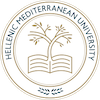The basic structures responsible for the evaluation procedures are at the Foundation level the Quality Assurance Unit and at the Department level the Internal Evaluation Team.
QAUD, appointed by a decision of the Assembly of the Department, among others:
- has the responsibility of conducting, in collaboration with MODIP, the Internal Evaluation Process in the Department,
- monitors the completion of Census Cards and Questionnaires and informs the bodies and members of the Department about the answers,
- gathers all the necessary elements for evaluation, and based on them
- prepares the Internal Evaluation Report (Self-Evaluation) of the Department, which it transmits to MODIP and through it to the Quality Assurance Authority in Higher Education (ADIP), and
- cooperates with ADIP for the organization and implementation of the External Evaluation.
- Antonidaki Emmanuil, Professor
- Stavroulaki Georgios, Professor
- Tatarakis Michail, Professor
Last External Evaluation (July 2012) of the Department of Electronic Engineering, TEI of Crete
The culmination of our previous efforts as the Department of Electronic Engineering of the TEI of Crete was the excellent External Evaluation of the Department, which took place in July 2012 by a committee of teachers/researchers appointed by the competent Quality Assurance Authority in Higher Education (ADIP).
The external evaluation of the Department was very good in all its points, as well as in the final conclusions (p. 26, section “F. Final Conclusions and recommendations of the EEC”) where the evaluators state: “Overall, this is an excellent department with enthusiastic faculty and staff. Its teaching curriculum is rich and extensive. Its research is among the very best. Its labs are numerous, and the services provided are in the right direction. Therefore, this Department is well guided and well-positioned to take advantage of its independence under the new State Law. Below, we summarize some of the recommendations already mentioned in the report above. . ».
Based on what is mentioned in the external evaluation, the Department of Electronic Engineering of the TEI of Crete had the following strong and weak points.
- Excellent Department with enthusiastic staff.
- Study program rich and extensive.
- The curriculum takes into account the demands of the job market, the needs of society, the courses of other universities, and the experiences of students and graduates.
- Section placed in the right development trajectory.
- Research among the best.
- Numerous workshops with good organization.
- Provided services in the right direction.
- Extremely effective training.
- Modern, well-structured, and in accordance with international standards educational methods.
- Suitable, quality, and modern educational material.
- Excellent, according to international standards, “production” of graduates.
- Excellent collaboration between teachers and students.
- Excellent connection to very good research activity with education.
- Impressive determination/ingenuity of the teaching staff, which ensures the educational operation under adverse economic conditions.
- Remarkable extroversion and mobility of teachers and students.
- The fact that the evaluation by the students is taken seriously.
- Laboratory equipment that requires renewal and enrichment.
- Non-flexible examination system that limits teachers ‘initiatives, but also students’ progress/reward.
- Long study time until graduation.
- Low average degree score.
Based on the above, we then distinguish the opportunities for the utilization of the positive points and the possible risks from the negative points:
Utilization opportunities
Taking advantage of the positive points of the Department, we can undoubtedly lead it to the top of the Departments of Electronic Engineering at a national and international level, as mentioned on page 24 of the external evaluation report «Therefore, this department is well positioned for pursuing excellence in the years to come. One may even state that this dept has the potential to become one of the best Electronics Dept in Greece over the next 10-15 years.»
Possible risks
- In a technology department dealing with state-of-the-art technology that is changing rapidly, laboratory equipment needs to be constantly updated and enriched in order for the Department to be competitive and to attract the best undergraduate and graduate students. Otherwise, the Department will be sidelined and left behind by technological developments.
- The long duration of studies and the low average score lead to the bad reputation of the Department and to the reduction of the value of the degree, as a result of which good students are not attracted.
External Evaluation (May 2016) of the TEI of Crete
In May 2016, the External Evaluation of the TEI of Crete was successfully carried out by the 5-member External Evaluation Committee appointed by the competent Quality Assurance Authority in Higher Education (ADIP). In total, the Commission evaluated 26 individual elements of strategy and practice that cover the entire range of operations of the TEI of Crete from research and teaching, to building infrastructure, student care, environmental strategy, and public relations.
In its remarks, the Commission noted a high level of commitment to excellence, a strong research culture, strong internationalization efforts, and general acceptance of the concepts of internal and external evaluation. The Foundation seems willing and able to improve. Of course, in addition to the positives, weak points were also identified.
Overall, the score was Positive evaluation, and according to the aggregate data, 9 of the 26 evaluation modules were evaluated with excellent (Worthy of merit), while 14 of the 26 modules were evaluated as positive. Only 3 cases were evaluated as partially positive evaluation, while in no case was a negative score used.
References
External Evaluation Report of the Department of Electronic Engineering, TEI of Crete
Report of the Department’s Adaptation to the External Evaluation Suggestions
External Evaluation Report of the TEI of Crete
